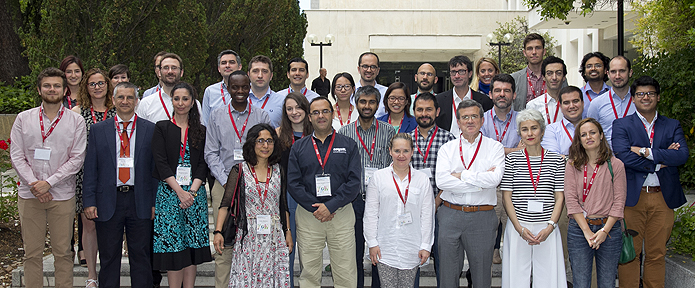Increasing the presence of women in the governments of countries at development benefits public health policies and Education
Sonia Bhalotra, an economist at the University of Essex, made the presentation at meeting on poverty and development of the University and the Ramón Areces Foundation, with the participation of speakers from the IMF and universities in seven countries.

Increasing the presence of women in the governments of countries at development has positive effects on public health policies, Education and legislation in favor of women. This was explained by Sonia Bhalotra, professor of Economics at the University of Essex (UK), at the V NCID Research Workshop, organized by the Navarra Center for International Development (NCID) of the University of Navarra and the Ramón Areces Foundation in Madrid.
This international meeting on Economics of development was attended by experts from global organizations such as the International Monetary Fund (IMF) and universities from seven countries, who presented the conclusions of the latest work on development and poverty.
Professor Bhalotra alluded to the limitations of women's representation in government: "They rarely run for office. It seems likely that they do not because party leaders would not elect them. These may be reluctant either because they reflect a bias among voters or because they themselves have a bias."
As a solution to increase the issue of women in executives, she pointed out that one way is " their access to the Education and media campaigns that highlight their good performance". She added that the creation of quotas for women in government can also be useful, although "research so far has shown ambiguous results in this regard.
Poverty, a problem of basic and social rightsFor his part, Gonzalo Hernández Licona, executive secretary of the Nationalcommittee assessment of Social development Policy - CONEVAL (Mexico), has referred to the origin of poverty: "Some believe it is a problem of lack of technical knowledge on the part of the population in poverty to face its challenges. But history sample with certain clarity that it is rather a problem of lack of basic and social rights".
Hernández Licona emphasized that reducing poverty "depends on both social policy (children in schools, improved housing, access to health and social security, as well as food) and economic policy (increased income, wages, employment, economic growth). Poverty will decrease faster to the extent that both policies are effective at the same time".
Christiana Anaxagorou, pre-doctoral researcher at the University of Sheffield (United Kingdom), referred to the financial aid foreign to nations at development and called for an "alliance between donor and recipient countries to share information" in order to gain in efficiency.
"This is determined by the behavior of governments and their decisions on how to invest the financial aid", he said. "It is important to examine whether it is spent as planned. That allows us to see what works and what doesn't, which is relevant considering that every year large amounts of resources are allocated to the international financial aid ."
In his opinion, "an investment in improving institutions first, together with a diary transparency and monitoring of public activities, would be a step in the right direction to ensure the quality of institutions in recipient countries".
Sustainable Development Goals developmentStefania Fabrizio, from the International Monetary Fund, was also among the speakers. In her speech she focused on the Sustainable Development Goals development and considered that achieving them requires actions at the national and international level.
"Country governments should strive to create a healthy macroeconomic environment and undertake measures for strong and sustainable growth," he argued. He expressed that these efforts should focus on building strong institutions to foster investor confidence; strengthening public finances; ensuring an efficient and well-defined public expense ; investing in infrastructure; maintaining debt sustainability; developing financial markets and favoring access to them while safeguarding financial stability; and promote inclusion and environmental sustainability.
Regarding the international sphere, he said that "a conducive external framework with economic and financial stability, and stable trade and financial flows, is also crucial for countries' development efforts to flourish."
"International cooperation is required to achieve coherence in macroeconomic policies across states; to ensure that financial regulations in major financial centers are appropriately shaped, mutually consistent and rigorously implemented; and to build a strong network of global financial security that provides confidence that unanticipated liquidity needs can be met," he concluded.
These were some of the speakers at the V NCID Research Workshop, organized by the Navarra Center for International Development (NCID) of the University of Navarra and the Ramón Areces Foundation. The NCID is a group of research of the Institute for Culture and Society (ICS), the research center in Humanities and Social Sciences of the University of Navarra. It seeks scientific solutions to situations of extreme poverty in countries in Africa, Asia and Latin America. To achieve this, it focuses on two lines: the quality of public and private institutions in each nation and the transfer of technologies.




